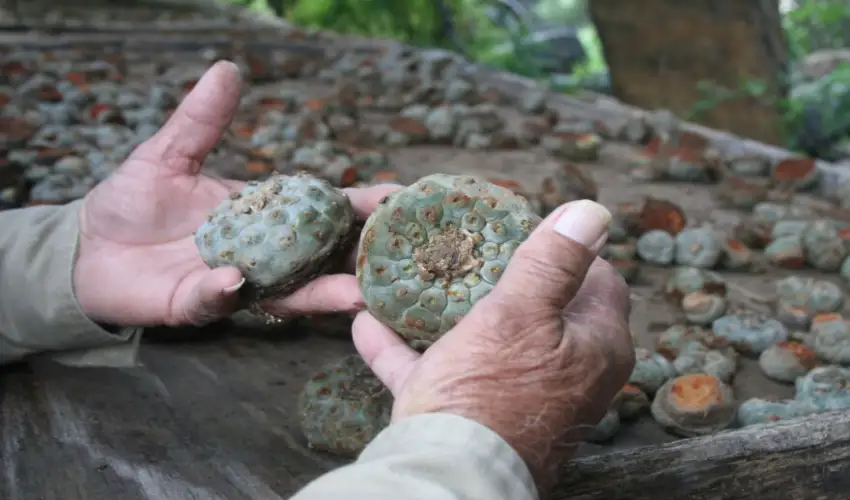Peyote cactus (Lophophora williamsii) is a small, spineless cactus native to the southwestern United States and Mexico. Revered for centuries by indigenous cultures, it is known for its potent psychoactive properties and deep spiritual significance. This sacred plant has been used in religious ceremonies, healing rituals, and for personal introspection. In this article, we explore the history, effects, and potential benefits of Peyote cactus, as well as its cultural and legal standing.
The History and Cultural Significance of Peyote
Peyote has been used for thousands of years, particularly by indigenous groups such as the Huichol, Tarahumara, and the Native American Church. Archaeological evidence suggests that peyote was utilized as early as 5,000 years ago. It was primarily ingested in sacred rituals to induce visions, foster spiritual enlightenment, and facilitate communication with deities.
The Huichol people of Mexico consider peyote for sale a divine gift and a central element of their religious beliefs. They embark on annual pilgrimages to the desert to harvest the cactus, believing that it connects them to the gods. The Native American Church, established in the late 19th century, legally incorporates peyote into its religious practices, viewing it as a sacrament that brings healing and guidance.
The Psychoactive Compound: Mescaline
The primary active compound in peyote is mescaline, a powerful psychedelic alkaloid. Mescaline interacts with serotonin receptors in the brain, leading to altered perception, vivid visual hallucinations, and profound introspective experiences. The effects of mescaline typically last between 6 to 12 hours, depending on dosage and individual sensitivity.
Users often report enhanced colors, intensified emotions, and a sense of interconnectedness with nature and the universe. While the experience can be deeply spiritual, it may also present challenges, such as nausea or psychological discomfort.
Potential Benefits and Uses of Peyote
- Spiritual and Psychological Healing
Many cultures and users believe that peyote facilitates deep emotional and psychological healing. It is often used to confront past traumas, gain insights into personal struggles, and foster spiritual awakening.
- Treatment for Depression and Anxiety
Research into psychedelic substances suggests that mescaline, like psilocybin and LSD, may have therapeutic potential for mental health disorders such as depression, PTSD, and anxiety. Some studies indicate that controlled peyote use can lead to long-lasting positive changes in mood and perspective.
- Enhanced Creativity and Self-Discovery
Artists, musicians, and creative individuals have reported profound inspirations after using peyote. The altered state of consciousness often provides fresh perspectives and new ways of thinking.
- Pain Management
Traditionally, indigenous healers have used peyote to relieve physical ailments, such as fever, rheumatism, and pain. Some studies suggest that mescaline may have analgesic properties, although more research is needed.
Legal Status and Ethical Considerations
The legal status of peyote varies across different countries. In the United States, peyote is classified as a Schedule I substance, meaning it is illegal to possess or distribute. However, the Native American Church has a legal exemption, allowing members to use peyote in religious ceremonies.
In Mexico, peyote is protected under conservation laws due to overharvesting and habitat destruction. Its collection is restricted to indigenous groups with traditional usage rights. In Canada and many European countries, peyote and mescaline are illegal, though some regions have begun to re-evaluate their stance on psychedelic substances.
Ethically, peyote conservation is crucial. Overharvesting for recreational or commercial use threatens the plant’s survival, making sustainable and respectful usage vital. Ethical psychedelic movements emphasize the importance of preserving indigenous traditions and protecting natural peyote populations.
How Peyote is Consumed
Peyote is traditionally consumed in various ways, including:
- Chewing the fresh cactus – Though bitter, this method allows direct absorption of mescaline.
- Dried Peyote Buttons – The small, disc-shaped tops of the cactus are dried and either chewed or brewed into a tea.
- Powder or Capsules – Some users grind dried peyote into powder and encapsulate it for easier ingestion.
Risks and Precautions
While peyote has been used safely for centuries, it is not without risks. Some potential side effects include:
- Nausea and vomiting – Common at the onset of the experience.
- Increased heart rate and blood pressure – May pose risks for individuals with cardiovascular conditions.
- Psychological distress – Can cause anxiety or paranoia, particularly in high doses or for individuals with underlying mental health issues.
- Legal repercussions – Unauthorized possession or use can result in legal consequences in many jurisdictions.
Conclusion
Peyote cactus is a sacred plant with profound spiritual and medicinal significance. Its psychoactive compound, mescaline, has the potential for healing, personal growth, and altered consciousness. While its legal status and conservation concerns pose challenges, peyote remains an essential part of indigenous traditions and modern psychedelic research. Those interested in peyote should approach it with respect, awareness, and ethical responsibility.
